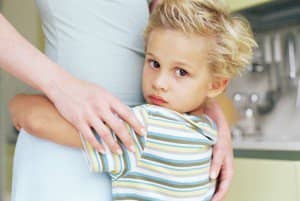When a family finds itself in the middle of a separation or divorce, one of the first worries is “what about the children?” Research has shown that while divorce can be hard on children, its often the fighting of the parents that most directly affects the children. And the impact depends on how well the parents are able to isolate the children from these disruptions.
Many psychologists and other therapists have tips and suggestions on how best to help your children at times like these. One organization that provides a very good pamphlet and other information is the Association of Family and Conciliation Courts.
Parenting is a lifelong job, and remember, you do not divorce your children. The following ideas are 7 tips to keep in mind to help buffer your children from the real and imagined problems they face during parental separation and or divorce:
1. Try to Maintain Consistency
One of the best things you can do is to maintain a regular routine and rules every day. It doesn’t matter how often your kids stay with you, having clear expectations for how they should behave is super important. This means:
- Make a plan for waking up, getting ready, school, chores, homework, TV time, and bedtime. Stick to this plan every day.
- Have clear rules about what happens if they behave well or not (like rewards for good choices and consequences for bad ones).
- Be strict but kind, and show them you love them.
During a divorce, kids might act out to see what they can get away with. It’s your job to be the steady grownup and show them life goes on even when things are not going smoothly.
Spending time with your kids regularly helps them feel safe and loved. Try to have some special one-on-one time with each child, even if it’s not for long. This will make a big difference for them.
2. Show Extra Affection
Another important point is that tough times are the best times to be more affectionate. You can show extra affection to your kids by talking openly with your kids so they feel safe sharing their feelings. Don’t hesitate to spend quality time with your child by engaging in activities they enjoy. When you start giving lots of hugs and cuddles, and saying kind things to make your child feel good about themselves. Also make an effort to listen to your kids without interruptions. Teach your youngster healthy coping mechanisms for their emotions. Be a source of strength by guiding them through challenges, celebrating their achievements. And always being there for them with patience and reassurance. As a parent you should always remember, a little more affection can make a big difference to children who are feeling scared or lonely. But, be careful, not to overdo this.
3. Avoid Reversing Roles
Don’t switch roles with your kids during a divorce. It’s normal for them to want to cheer you up, but it’s best to keep the parent-child roles clear. You don’t want them to feel like they have to take care of you or your ex. That’s too much for them. Instead, get help from experts so you can concentrate on being there for your kids the way they need. By making sure they don’t shoulder adult responsibilities, you’re giving them the space to just be kids and helping them through this rough patch with strength and resilience.
4. Foster Connections
Help your children to stay connected. You should support your kids when they wanna hang out with friends or do stuff. It’s not a good move to switch schools or daycares if you can help it. Sometimes schools can bend the rules if you’re moving apart. You can talk to your therapist or school counselor about it. Even if you must move to a distant neighborhood and school district, make an effort to have sleepovers and playdates with their old friends, and encourage new friendships too.
5. Reassure Basic Needs
Reassure your children about the basic necessities. Your children need to hear that both parents still love them and that the problems aren’t their fault. So, Tell your kids that they’ll still get what they need, like food and a place to live. Let them know that you both parents still care about them, and that any troubles aren’t because of them.
Sometimes when parents argue about where to sleep, your kids might get scared and think they’ll have to sleep in the car. But no matter what, parents have to make sure their kids have everything they need – a comfy place to live, food, clothes, school stuff, and more. Tell your kid it’s all good, and that both parents are taking care of everything. And let them know they don’t need to worry about this stuff.
6. Minimize Exposure to Conflict
Shield your children from witnessing or being involved in parental disputes. Both parents should keep disagreements private. Always keep in mind, kids have a knack for overhearing things. Avoid putting them in the middle or making them deliver messages during arguments – that’s not their job. And as for asking them about your ex, it’s best to resist the temptation. If you really need to know something, just give your ex a call directly.
7. Prioritize Self-Care
Taking care of yourself is really important, especially during challenging times. This is true for everyone, whether you have kids or not. To feel your best, eat healthy foods, get enough sleep, and exercise regularly. Don’t shut yourself off from others – spend time with friends and family who make you feel good. If you’re feeling stressed, anxious, or angry, it’s okay to ask for help from a therapist near you or take a consultation from 2houses. Family therapy can also be a great resource for you.
Remember, the more you take care of yourself, the better you can take care of the people around you!










